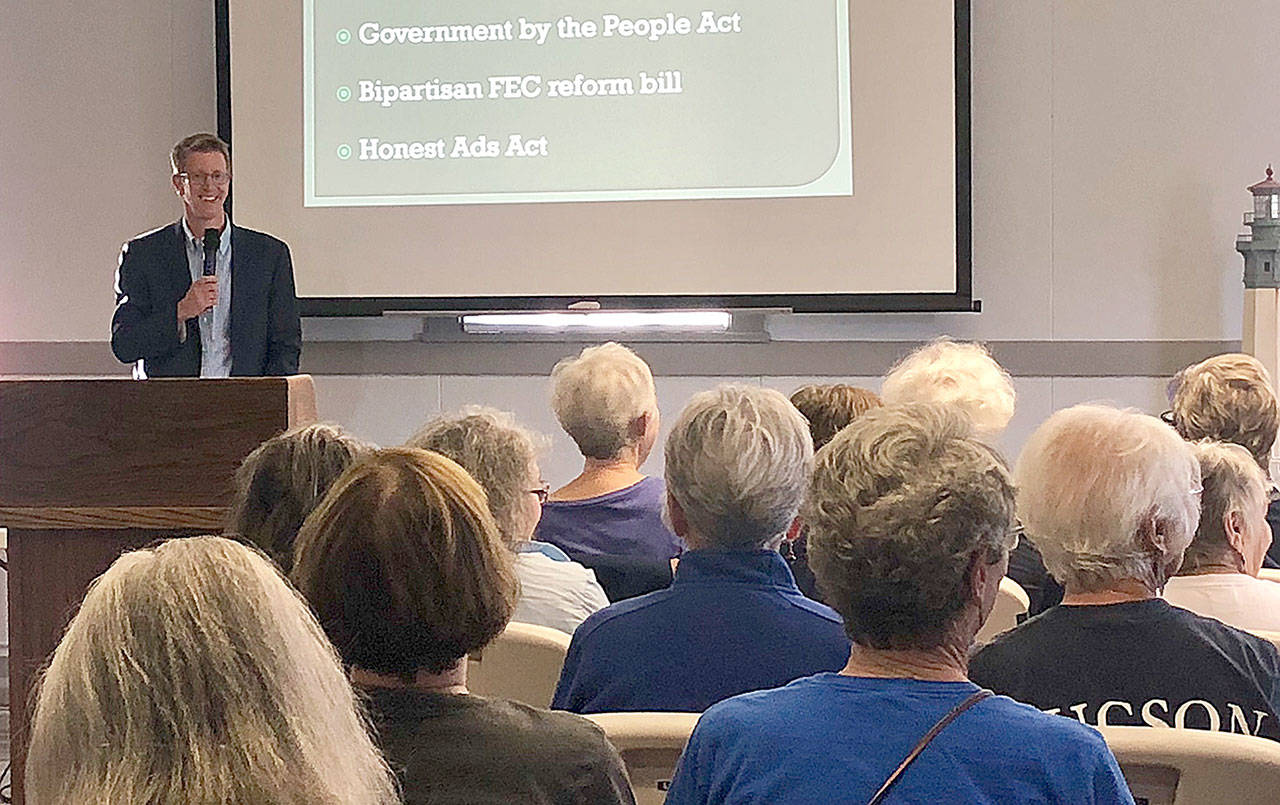Congressman Derek Kilmer shared “a really good dialogue” with about 60 people at his town hall meeting in Westport on Monday evening.
Topics discussed included access to health care, the economy, access to broadband and tsunami preparedness.
“What is abundantly clear is people have a real appetite for seeing government work better and for seeing the economy work better,” said Kilmer. “A lot of the questions I got were in that arena and, frankly, that’s a lot of what I work on.”
Access to quality, affordable health care was discussed at length.
“We had a good conversation around health care,” said Kilmer. “I think there is a real desire to make sure that more people have more access to quality, affordable health care, and that’s a priority for me too. I think it’s of particular importance in rural areas, where we’ve seen challenges with regard to the availability to primary care.”
Medicaid and Medicare reimbursement rates are also challenging for rural hospitals, and Kilmer’s been focusing his attention on that at the federal level.
“In the economic arena they had questions about the importance of career and technical education, vocational programs,” said Kilmer. “I’ve sponsored some legislation to support that.”
Broadband access is also a challenge in rural areas.
“The district I represent is at the bottom 20 percent in the country in access to broadband,” said Kilmer. He said his Broadband for All Act is focused on “bridging that digital divide.”
Kilmer said he was asked what the federal government could do to help with the region’s opioid crisis.
“One thing I said was everyone on the issue has been able to find some common ground,” said Kilmer. “One is having the Food and Drug Administration evaluate the addictive qualities of medications before they are approved. And communicating, making sure both medical providers and patients are aware of those risks.”
One of the biggest areas of need is adequate substance abuse and mental health treatment facilities, said Kilmer. “We are starting to see some forward progress on that, and I’m trying to urge more federal support in that area.”
There is no single “cure” for the opioid epidemic, said Kilmer.
“What I said (Monday) was there is no silver bullet to addressing the opioid crisis,” he said. “It’s more like silver buckshot. There’s a lot of levers that have to be pulled there.”
Kilmer said experts say there needs to be 40 to 60 treatment beds per 100,000 population to address the treatment need. Currently, we’re at less than 13 per 100,000.
“You see mental health and substance abuse issues either not being addressed, or not being addressed in the right setting,” said Kilmer. “In nearly every county I represent the largest provider of those services is the county jail, and that is not where you should be providing treatment.” Same goes for emergency rooms, he said. “Part of my job is to try to get some more federal support there.”
The general operation of government was discussed.
“Frankly the House has been very productive in terms of producing legislation to stabilize the health care system, lower the cost of prescription drugs, addressing civil rights issues, to protect a free and open Internet, and those bills are currently languishing in the Senate,” said Kilmer.
The questions centered around whether or not the Senate would take up the issues from the House.
“The House has made progress in those areas,” said Kilmer, and participants in the Westport town hall were curious as to the process for the Senate to continue working on that legislation.
“I think we are lucky to have Senators in our state leading the charge on some of these issues, and my hope is the Senate majority leader will bring these to a vote,” said Kilmer.
There was talk about jobs, both at the town hall and a job fair and forum attended by Kilmer at WorkSource in Aberdeen earlier in the day.
“One of the things worth acknowledging is there are a lot of people who need jobs, but we also have a lot of jobs that need people,” said Kilmer. He said a round table with work force development leaders and local businesses in Aberdeen earlier Monday gave him a sense of what the federal government can do to help connect people who need jobs with the skills the local job market seeks.
Kilmer also addressed some of the concerns in Westport about tsunami preparedness.
“I serve on the Appropriations Committee and we were able to secure some additional funds for the tsunami warning system, for an earthquake early warning system, and some funding for coastal resiliency,” he said. “Unfortunately, the federal government spends billions of dollars after a disaster, I think it would be a smart investment to make on the front end to mitigate that damage and hopefully save lives.”


